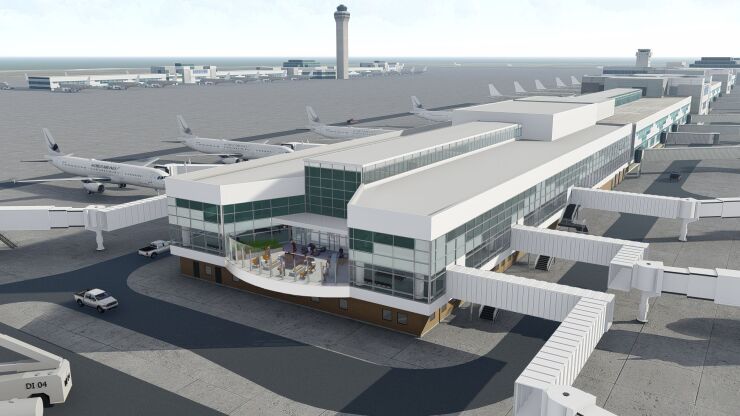Denver International Airport sees opportunity in calamity as it accelerates its $1.5 billion gate expansion plan during a time of minimal airline activity.
With the dramatic drop in boardings amid the COVID-19 pandemic, Denver plans to apply up to $560 million of existing bond funds to accelerate the gate construction project. The bond proceeds come from a $2.1 billion issue in 2018, according to airport chief financial officer Gisela Shanahan.

“The investors who purchase our bonds are basically securing the bonds with the assets and are counting on the airport being able to implement those assets in a revenue producing manner so that they can then be repaid.” Shanahan told the Denver City Council’s Local Disaster Response Committee on May 4.
“So, we do have that legal obligation and then in addition, if we stop construction on any bond-funded project, we are then unable to recover those costs, amortize those costs from the airlines, which is how we pay the debt,” she said. “So, if we were unable to do that, we would have to pay the debt solely from airport funds. There are opportunities in this challenging time, and the opportunity is to consolidate and accelerate multi-year programs, pull them forward.”
The full council approved the $560 million adjustment in contracts at its May 19 meeting.
The gate expansion is part of a $3.5 billion capital improvement program that includes $770 million to remodel the Jeppesen Terminal, which, until last year, was a public-private project managed by the consortium Great Hall Partners and is now under contract to new construction firms. The estimated cost of the Great Hall Project increased by $120 million under the new terms after
Passenger screenings at security checkpoints have fallen as much as 95% in some weeks as Americans stopped traveling amid quarantines designed to reduce the spread of the coronavirus. Between May 10 and May 16, passenger and employee traffic through checkpoints was down about 89% compared to the same week in 2019. Memorial Day weekend traffic was expected to be down about 85% from 2019.
In April, the Transportation Security Administration reported that 17 TSA employees at Denver tested positive for coronavirus. All but one of those employees were screening officers. The airport now requires airport employees and passengers to wear face masks.
In April, Denver's dominant carrier, United, reported a first-quarter net loss of $1.7 billion and vowed to protect passenger safety while keeping the airline flying.
“We have been at the forefront of warning how deep of an impact we expect this crisis could have and how long we expect it could last,” said United chief executive Oscar Munoz. “We've also led the industry in taking decisive steps to mitigate the operational and financial impacts of COVID-19 — making deep schedule reductions, drastically reducing spending and aggressively raising liquidity."
DIA was eligible for $269 million in federal funds through the Coronavirus Aid, Relief and Economic Security Act stimulus package, which was signed into law on March 27. The CARES Act provides about $10 billion in grants for airports experiencing severe economic disruption caused by the COVID-19 health emergency. The CARES Act is the largest economic relief package in U.S. history.
To make the best of the reduced passengers using the terminal, the terminal contractor was allowed to increase the amount of work done during the daytime. Work had been deferred to late nights when traffic was lower.
Moody’s Investors Service lowered the outlook on Denver International’s $5.1 billion of outstanding debt to stable from positive on April 16. The rating on $1.92 billion of senior debt is A1, and $3.2 billion of subordinate-lien bonds carry A2 ratings.
The revision “reflects Moody's expectation that operational disruptions caused by the coronavirus outbreak will persist throughout 2020, causing a high level of uncertainty and making an upgrade unlikely,” analyst Earl Heffintrayer said. “The stable outlook reflects the ample liquidity available to withstand the outbreak and Moody's expectation that enplanements will recover significantly over the next two to three years to support the current rating levels.”
On March 31, Fitch Ratings revised its stable outlook on DIA and other large hubs to negative from stable. Fitch rates the airport’s senior-lien debt AA-minus and subordinate lien A-plus.
S&P Global Ratings also has a negative outlook on DIA’s senior-lien bonds rated A-plus and subordinate lien rating of A.
United and Southwest airlines have already signed leases for the gates the airport is adding. The other work includes refurbishing restrooms, moving walkways, ramps and outdoor gate-apron areas that have suffered wear and tear since the airport’s 1995 opening.
United had planned to raise $2.25 billion through notes offered May 8 but called off the deal when rates came in above what was expected. The notes, rated BB-plus by S&P Global Ratings with a negative outlook were to have been secured by a pool of 360 aircraft.
United has been Denver’s fortress hub carrier since DIA opened in 1995. The airport, like its predecessor Stapleton International Airport, was designed to hub both United and Continental Airlines. But Continental closed its Denver hub before the airport opened. Through a series of bankruptcies and mergers, United and Continental are now one airline. United and its regional affiliates represented 47% of passengers though the airport in January.
Southwest, which didn't serve Denver when DIA opened, started flying there in 2006 and is now solidly DIA's #2 carrier, representing 27% of passengers in January.
United will add 24 of the new gates to its concourse and Southwest will take 16, with some opening next year.
“We have obligations to our airline partners to move them into the spaces that they have agreed to and signed up for on their leases,” airport director Kim Day told the city council. “And we can take advantage of the low traffic right now to complete projects much more efficiently.”





